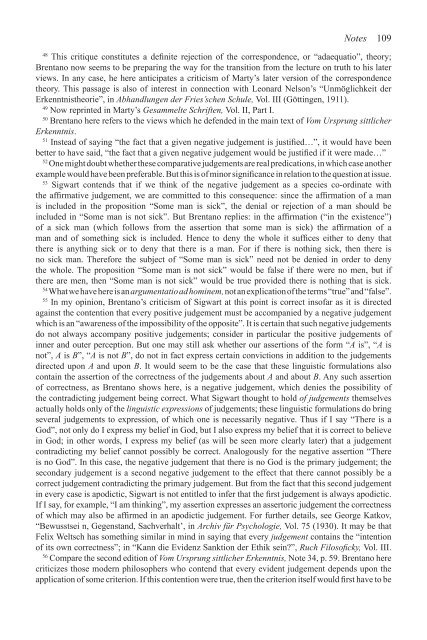Franz Brentano_The True and the Evident.pdf
Franz Brentano_The True and the Evident.pdf
Franz Brentano_The True and the Evident.pdf
You also want an ePaper? Increase the reach of your titles
YUMPU automatically turns print PDFs into web optimized ePapers that Google loves.
Notes 109<br />
48 This critique constitutes a definite rejection of <strong>the</strong> correspondence, or “adaequatio”, <strong>the</strong>ory;<br />
<strong>Brentano</strong> now seems to be preparing <strong>the</strong> way for <strong>the</strong> transition from <strong>the</strong> lecture on truth to his later<br />
views. In any case, he here anticipates a criticism of Marty’s later version of <strong>the</strong> correspondence<br />
<strong>the</strong>ory. This passage is also of interest in connection with Leonard Nelson’s “Unmöglichkeit der<br />
Erkenntnis<strong>the</strong>orie”, in Abh<strong>and</strong>lungen der Fries’schen Schule, Vol. III (Göttingen, 1911).<br />
49 Now reprinted in Marty’s Gesammelte Schriften, Vol. II, Part I.<br />
50 <strong>Brentano</strong> here refers to <strong>the</strong> views which he defended in <strong>the</strong> main text of Vom Ursprung sittlicher<br />
Erkenntnis.<br />
51 Instead of saying “<strong>the</strong> fact that a given negative judgement is justified…”, it would have been<br />
better to have said, “<strong>the</strong> fact that a given negative judgement would be justified if it were made…”<br />
52 One might doubt whe<strong>the</strong>r <strong>the</strong>se comparative judgements are real predications, in which case ano<strong>the</strong>r<br />
example would have been preferable. But this is of minor significance in relation to <strong>the</strong> question at issue.<br />
53 Sigwart contends that if we think of <strong>the</strong> negative judgement as a species co-ordinate with<br />
<strong>the</strong> affirmative judgement, we are committed to this consequence: since <strong>the</strong> affirmation of a man<br />
is included in <strong>the</strong> proposition “Some man is sick”, <strong>the</strong> denial or rejection of a man should be<br />
included in “Some man is not sick”. But <strong>Brentano</strong> replies: in <strong>the</strong> affirmation (“in <strong>the</strong> existence”)<br />
of a sick man (which follows from <strong>the</strong> assertion that some man is sick) <strong>the</strong> affirmation of a<br />
man <strong>and</strong> of something sick is included. Hence to deny <strong>the</strong> whole it suffices ei<strong>the</strong>r to deny that<br />
<strong>the</strong>re is anything sick or to deny that <strong>the</strong>re is a man. For if <strong>the</strong>re is nothing sick, <strong>the</strong>n <strong>the</strong>re is<br />
no sick man. <strong>The</strong>refore <strong>the</strong> subject of “Some man is sick” need not be denied in order to deny<br />
<strong>the</strong> whole. <strong>The</strong> proposition “Some man is not sick” would be false if <strong>the</strong>re were no men, but if<br />
<strong>the</strong>re are men, <strong>the</strong>n “Some man is not sick” would be true provided <strong>the</strong>re is nothing that is sick.<br />
54 What we have here is an argumentatio ad hominem, not an explication of <strong>the</strong> terms “true” <strong>and</strong> “false”.<br />
55 In my opinion, <strong>Brentano</strong>’s criticism of Sigwart at this point is correct insofar as it is directed<br />
against <strong>the</strong> contention that every positive judgement must be accompanied by a negative judgement<br />
which is an “awareness of <strong>the</strong> impossibility of <strong>the</strong> opposite”. It is certain that such negative judgements<br />
do not always accompany positive judgements; consider in particular <strong>the</strong> positive judgements of<br />
inner <strong>and</strong> outer perception. But one may still ask whe<strong>the</strong>r our assertions of <strong>the</strong> form “A is”, “A is<br />
not”, A is B”, “A is not B”, do not in fact express certain convictions in addition to <strong>the</strong> judgements<br />
directed upon A <strong>and</strong> upon B. It would seem to be <strong>the</strong> case that <strong>the</strong>se linguistic formulations also<br />
contain <strong>the</strong> assertion of <strong>the</strong> correctness of <strong>the</strong> judgements about A <strong>and</strong> about B. Any such assertion<br />
of correctness, as <strong>Brentano</strong> shows here, is a negative judgement, which denies <strong>the</strong> possibility of<br />
<strong>the</strong> contradicting judgement being correct. What Sigwart thought to hold of judgements <strong>the</strong>mselves<br />
actually holds only of <strong>the</strong> linguistic expressions of judgements; <strong>the</strong>se linguistic formulations do bring<br />
several judgements to expression, of which one is necessarily negative. Thus if I say “<strong>The</strong>re is a<br />
God”, not only do I express my belief in God, but I also express my belief that it is correct to believe<br />
in God; in o<strong>the</strong>r words, I express my belief (as will be seen more clearly later) that a judgement<br />
contradicting my belief cannot possibly be correct. Analogously for <strong>the</strong> negative assertion “<strong>The</strong>re<br />
is no God”. In this case, <strong>the</strong> negative judgement that <strong>the</strong>re is no God is <strong>the</strong> primary judgement; <strong>the</strong><br />
secondary judgement is a second negative judgement to <strong>the</strong> effect that <strong>the</strong>re cannot possibly be a<br />
correct judgement contradicting <strong>the</strong> primary judgement. But from <strong>the</strong> fact that this second judgement<br />
in every case is apodictic, Sigwart is not entitled to infer that <strong>the</strong> first judgement is always apodictic.<br />
If I say, for example, “I am thinking”, my assertion expresses an assertoric judgement <strong>the</strong> correctness<br />
of which may also be affirmed in an apodictic judgement. For fur<strong>the</strong>r details, see George Katkov,<br />
“Bewusstsei n, Gegenst<strong>and</strong>, Sachverhalt’, in Archiv für Psychologie, Vol. 75 (1930). It may be that<br />
Felix Weltsch has something similar in mind in saying that every judgement contains <strong>the</strong> “intention<br />
of its own correctness”; in “Kann die Evidenz Sanktion der Ethik sein?”, Ruch Filosoficky, Vol. III.<br />
56 Compare <strong>the</strong> second edition of Vom Ursprung sittlicher Erkenntnis, Note 34, p. 59. <strong>Brentano</strong> here<br />
criticizes those modern philosophers who contend that every evident judgement depends upon <strong>the</strong><br />
application of some criterion. If this contention were true, <strong>the</strong>n <strong>the</strong> criterion itself would first have to be
















